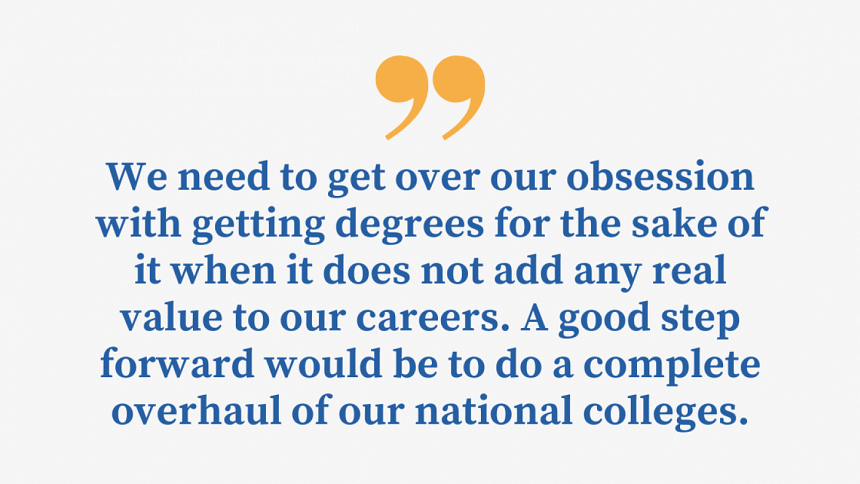Our public education system's strange fetish for useless degrees

I studied Biochemistry and Molecular Biology at Dhaka University (DU). Pure sciences are usually considered "rich man's subjects" in general, requiring more resources for the laboratory settings compared to the applied sciences. So, the funds that the government provides to departments like Biochemistry, even in the so-called best institutions like DU, are merely adequate enough to set up labs that mostly resemble a 1950s-70s biochemistry lab as per the global standard.
Our public universities conduct a four-year degree following the US' convention. The American argument for a four-year system is that the first year is somewhat exploratory for the students, and in the final year, they write a thesis. However, not surprisingly, we copied the US convention but left out all of its perks. Our students are enrolled in specific departments under specific majors from the get-go, with no scope for "exploration" whatsoever. And, of course, my department could not even provide a thesis opportunity for their undergraduate fourth year students.
Why is that the case, you may wonder. The reason, of course, was that there were Master's students who needed to be accommodated first. So, the university did not have enough space for undergraduates.
However, it's time we ask about the very legitimacy of the Master's degrees being administered in our public universities. The only reason anyone should acquire an MSc degree anywhere is for research experience, and the research that is being conducted in universities here definitely does not meet the global standard for that of an MSc degree, and would have been better served by an undergraduate thesis instead. However, once I acquired my Bachelor's degree, I was, in a way, forced to go for an MSc degree. I wanted to apply to universities abroad but they all required research experience. So, I had to spend an extra 1.5 years getting an MSc degree and official research experience, which, in retrospect, I consider to have been a complete waste of my time.
I do not blame my institution alone for this. We, as a nation, have a strange fetish for degrees, even if the degree does not add any real value. And because everyone is getting useless degrees, employers also raise their entry bars to match and require an MSc degree. Thus, such useless MSc degrees are normalised. Nobody profits from this. Not the university, not employers, and certainly not the students who have to spend a year or more working for the MSc. But everyone is happy because they can claim to have a postgraduate degree. It's almost like we are too ashamed to admit the current infrastructure is too underfunded to give out any MSc degrees at all. So, we are attaching fake tags to our low quality products and convincing ourselves they are actually quality products.
It's high time we abolish this farce in the name of education and save the precious years of our early adulthood.
As deplorable as our public universities are, the national colleges are an even bigger scam. They are essentially unemployment factories which serve no function whatsoever apart from filling the demand for our degree fetish while wasting the public money. This same fund could be more effectively used for setting up technical colleges. But the sad truth is that we would like to complete a four-year graduate programme – even if that leaves us unemployed – so that we can tell everyone we are "graduates."
Imitation of a good system can be fruitful if done properly. But this watered-down imitation of the American system is costing us money, youth, and time.
Bachelor's programmes in the US span four years because in the first year the students get to enrol in a variety of courses to explore their interests before they decide what their major should be. As our current tertiary education infrastructure does not allow students to explore their interests before deciding on a major, there is really no justification for the extra year, which costs us time and money. We should therefore go back to our previous three-year graduation format, which is also a standard in Europe.
Secondly, MSc programmes should either be eliminated or severely restricted. The resources freed up from eliminating MSc programmes can be better utilised to include a thesis course in undergraduate programmes so that students do not have to get an MSc degree just to acquire some research experience. If this is implemented, our students can apply to universities abroad as soon as they complete their graduation, and employers will also eventually stop asking for MSc degrees for entry-level jobs. After all, why should an entry-level job require an MSc degree?

Finally, as a society, we need to get over our obsession with getting degrees for the sake of it when it does not add any real value to our careers. A good step forward would be to do a complete overhaul of our national colleges. Our economy demands technically skilled personnel, which aren't being created by our tertiary education system. As the national colleges are nowhere near the global standard in terms of giving out even Bachelor's degrees (let alone MSc degrees), the resources would be best utilised by establishing a quality technical education infrastructure.
Instead of catering to our degree fetish and staying caught up in the cycle of conducting and acquiring useless degrees, we need to get rid of these degrees altogether and focus on improving the quality of the degrees we're currently disbursing. We also need to bestow upon technical education the significance it receives in developed countries.
Shafaat Hossain is a graduate student at the University of Houston in the US.

 For all latest news, follow The Daily Star's Google News channel.
For all latest news, follow The Daily Star's Google News channel. 





Comments